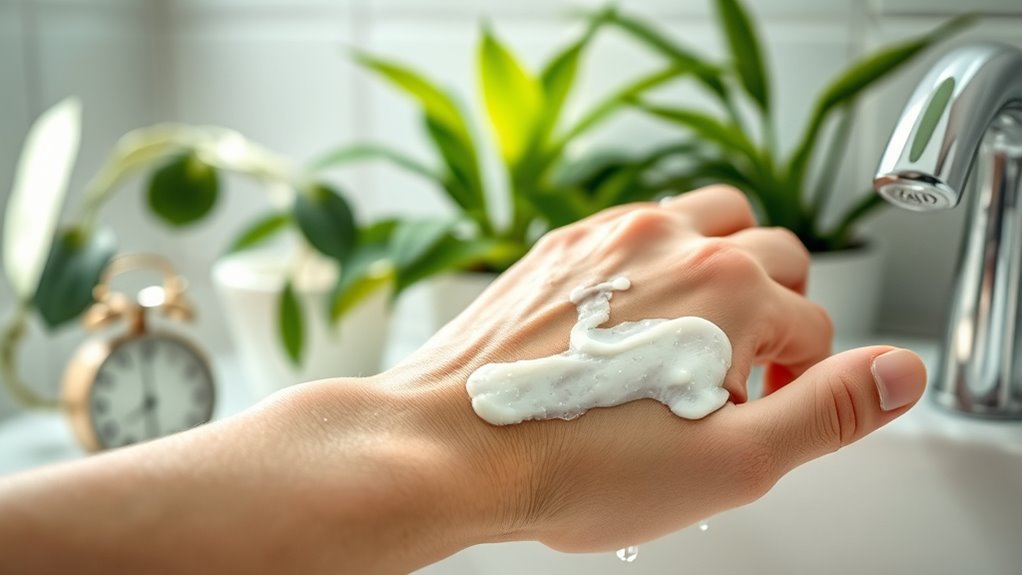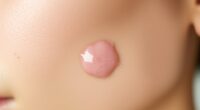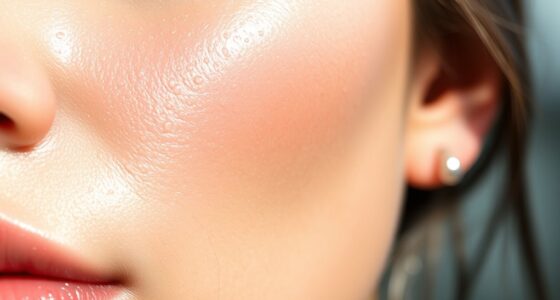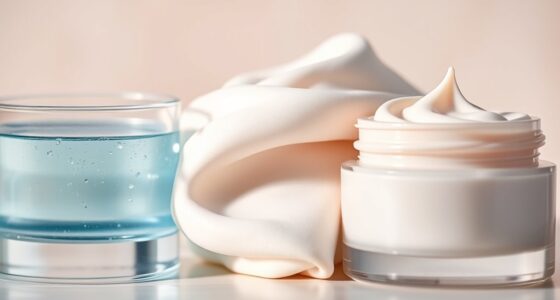Exfoliating your skin is crucial for a fresh, glowing complexion, but it’s important not to overdo it. Aim to scrub once or twice a week, depending on your skin’s sensitivity. Too much exfoliation can cause irritation and redness, so find that sweet spot. Using gentle scrubs or chemical exfoliants can make a big difference in your routine. Stick with a balanced approach, and you’d be surprised how much more there is to learn about keeping your skin healthy and radiant.
Key Takeaways
- Exfoliate once or twice a week to maintain healthy skin without causing irritation.
- Choose physical or chemical exfoliants based on your skin type and sensitivity.
- Over-exfoliation can lead to redness and irritation, so balance is crucial.
- Tools like loofahs enhance physical exfoliation, while AHAs/BHAs effectively work chemically.
- Regular exfoliation can improve skin texture, unclog pores, and enhance moisture absorption.

When it comes to achieving healthy, glowing skin, exfoliation plays a vital role. It’s the process of removing dead skin cells from your skin’s surface, improving both texture and appearance. Regular exfoliation is essential for maintaining that radiant look you desire, as it clears away dead cells and debris that can dull your complexion. Incorporating exfoliation into your skincare routine can lead to smoother skin, reduced fine lines, and unclogged pores. Additionally, regular exfoliation can enhance cacao’s health benefits, including its mood-enhancing properties. Moreover, regular skin treatments can complement your exfoliation efforts for optimal skin health.
You’ve got two main methods for exfoliation: physical and chemical. Physical exfoliants, like scrubs and brushes, manually slough off dead cells, while chemical exfoliants use acids to dissolve them without any scrubbing. Depending on your skin type—whether it’s oily, dry, or sensitive—you’ll want to choose the method that suits you best. For instance, if you have sensitive skin, you might prefer gentle enzyme peels over harsher scrubs. It’s also advisable to consider potential side effects when selecting your exfoliation method to avoid irritation.
The benefits of exfoliation extend beyond just a better texture. It increases circulation, enhancing blood flow to the skin’s surface, which nourishes and revitalizes your complexion. Additionally, increased circulation contributes to a more youthful and radiant appearance. Plus, exfoliation helps your skin absorb moisture more effectively, leading to a more radiant and youthful appearance. Regularly exfoliating can also reduce dark spots and hyperpigmentation, giving you a more even skin tone.
Exfoliation boosts circulation and moisture absorption, resulting in a radiant complexion and a more even skin tone.
As a bonus, it allows your other skincare products to penetrate deeper, making them more effective.
How often should you exfoliate? Generally, it’s recommended to exfoliate once or twice a week, depending on your skin’s sensitivity. Over-exfoliation can lead to irritation and redness, so it’s essential to find the right balance. If you’re using a physical exfoliant, tools like loofahs or textured gloves can help you achieve results. For a chemical approach, consider products with AHAs or BHAs, which can work wonders without the need for scrubbing.
If you’re dealing with specific skin issues, like ingrown hairs or acne, regular exfoliation can be particularly beneficial. By clearing debris from hair follicles, you can prevent ingrown hairs. Exfoliating also helps unclog pores, reducing breakouts. For those with dry skin, regular sloughing off of flakiness allows for better moisturizer absorption.
Frequently Asked Questions
Can Exfoliation Help With Acne-Prone Skin?
Yes, exfoliation can definitely help with acne-prone skin. By removing dead skin cells, you reduce the chance of clogged pores, which often lead to breakouts.
Using gentle chemical exfoliants like glycolic or salicylic acid can effectively treat acne without irritating your skin. Regular exfoliation also improves the absorption of your other skincare products, making them more effective.
Just remember to be consistent and avoid over-exfoliating to keep your skin balanced and healthy.
Is Physical or Chemical Exfoliation Better for Sensitive Skin?
When it comes to sensitive skin, chemical exfoliation is often better than physical.
Gentle options like lactic acid or enzymes provide effective skin renewal without the risk of irritation that physical scrubs or tools can cause. They penetrate deeper, enhancing your skin’s texture and elasticity.
Just remember to patch test before trying new products, and always moisturize afterward to keep your skin hydrated and protected from potential irritation.
Should I Exfoliate Before or After Cleansing?
You should consider exfoliating after cleansing for the best results.
Cleansing first removes surface dirt, giving exfoliants a clean canvas to work on deeper impurities. This method enhances exfoliation efficiency and minimizes irritation, making it suitable for most skin types.
However, if you’re dealing with oily skin, exfoliating before cleansing might be beneficial.
Ultimately, find what works best for your skin’s unique needs while maintaining a balanced routine.
Can I Exfoliate if I Have Rosacea?
You might think exfoliating isn’t possible with rosacea, but it can be done carefully.
You should choose gentle exfoliants like polyhydroxy acids, avoiding harsh scrubs. Start by exfoliating once a week, adjusting as your skin tolerates it.
Always apply gently, and follow up with a soothing moisturizer. Listen to your skin; if irritation occurs, scale back.
With the right approach, you can improve your skin’s texture without worsening rosacea symptoms.
What Ingredients Should I Avoid When Exfoliating?
When exfoliating, you should avoid harmful ingredients like nut shells, sea salt, and fruit pits, as they can cause micro-tears and irritation.
Stay clear of microbeads, which aren’t only harmful to your skin but also to the environment.
If you’re using chemical exfoliants, be cautious with high concentrations of AHAs or BHAs, as they can irritate sensitive skin.
Always choose gentle, biodegradable options to keep your skin and the planet healthy.
Conclusion
In conclusion, exfoliating can transform your skin, but it’s essential to find the right balance. Did you know that 70% of people don’t exfoliate regularly? By incorporating this vital step into your skincare routine 1-3 times a week, you’ll reveal a brighter, smoother complexion while preventing clogged pores. So, don’t skip the scrub—your skin will thank you! Remember, consistency is key for achieving that radiant glow you’ve always wanted. Happy exfoliating!









